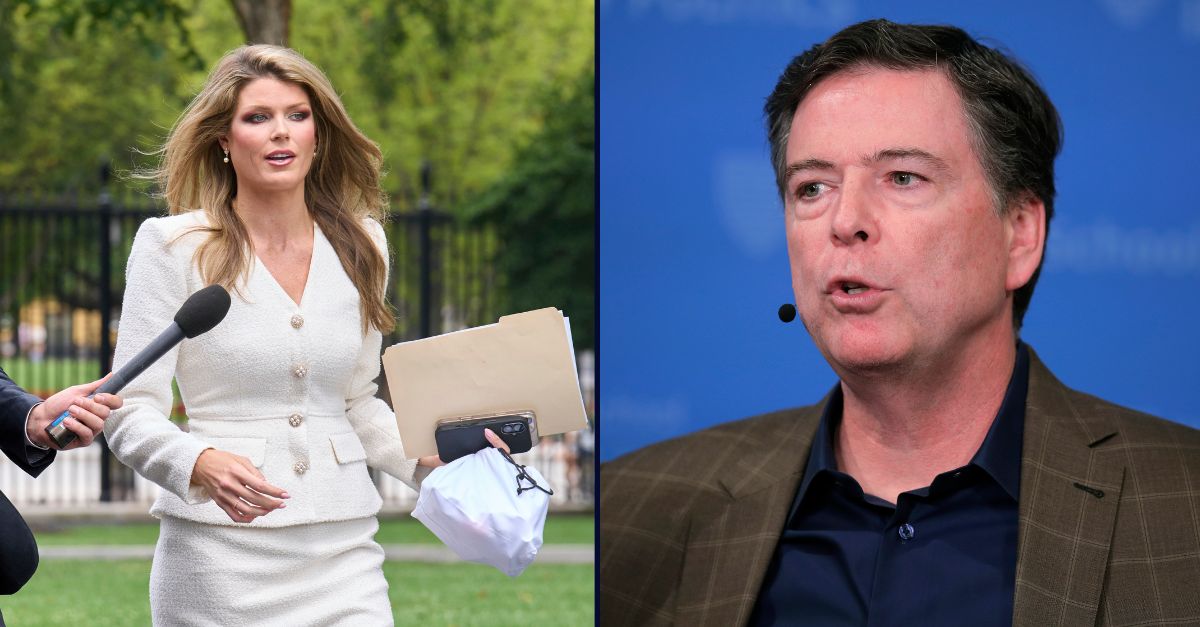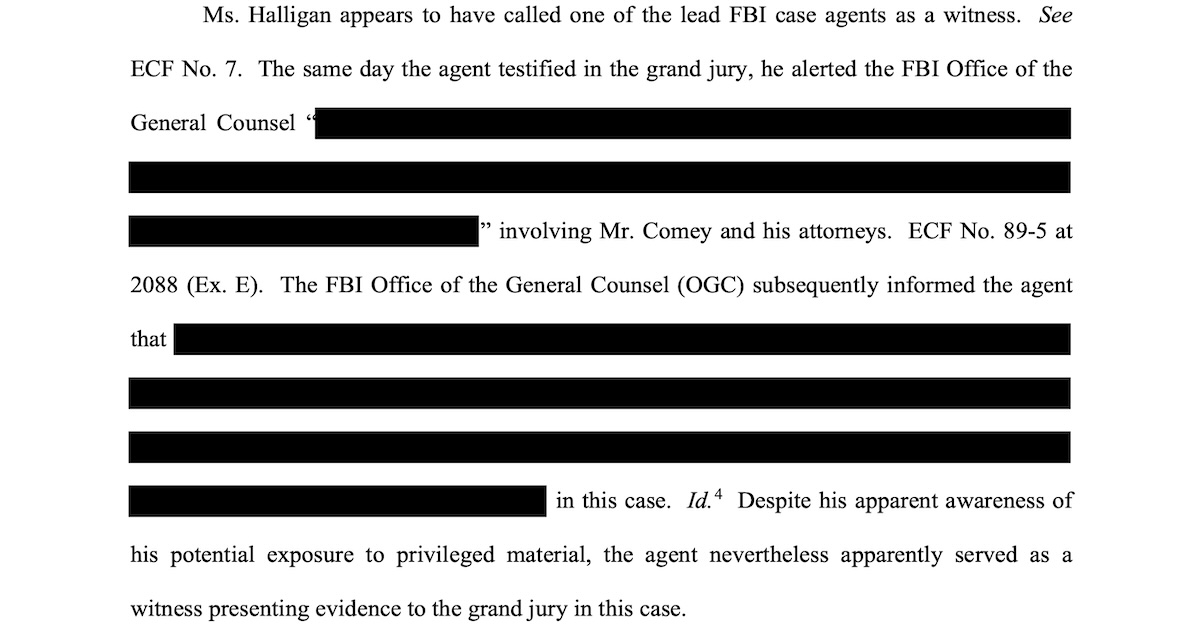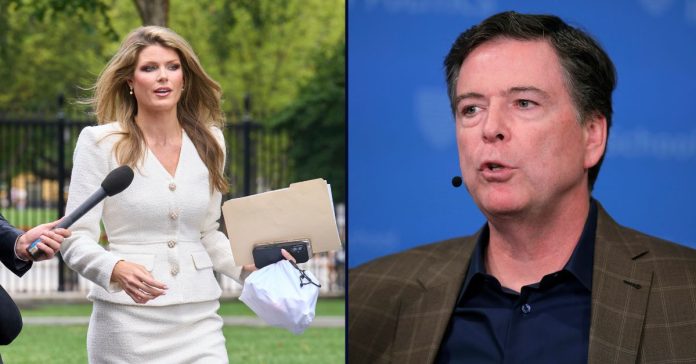
Left: Lindsey Halligan, special assistant to the president, speaks with a reporter outside of the White House, Wednesday, Aug. 20, 2025, in Washington. (AP Photo/Jacquelyn Martin). Right: Former Director of the Federal Bureau of Investigation James Comey gestures while addressing a gathering at Harvard University”s Institute of Politics’ JFK Jr. Forum in Cambridge, Mass., Monday, Feb. 24, 2020. (AP Photo/Charles Krupa).
Piling on an already substantial list of motions to dismiss, former FBI Director James Comey alleged that “potential misconduct,” “severe,” “pervasive,” and “abundant irregularities,” including the possibility that grand jurors felt they couldn’t leave unless they indicted him, provides an alternate reason to bring the obstruction and false statement case to an end.
A 26-page motion in support of disclosing grand jury proceedings slams the charges for “facially misstat[ing]” his testimony.
Next, Comey argued that interim U.S. Attorney for the Eastern District of Virginia Lindsey Halligan, an ex-insurance lawyer who “lacks any prosecutorial experience” and installed at the urging of her former client President Donald Trump, secured the rush indictment “after business hours with a meager 14 votes after an earlier no true bill” — all with the help of a potentially “tainted” FBI special agent, who “may have been exposed” to attorney-client privileged information, serving as a witness.
“Although proceedings before the grand jury are typically entitled to a presumption of regularity, the abundant irregularities surrounding the return of the indictment in this case overcome that presumption and warrant disclosure of the grand jury record,” the filing said, to buttress the case for the defense to get its hands on grand jury details. “Those irregularities may create a basis for dismissing the indictment.”
Again arguing that Halligan was unlawfully appointed, Comey said that the rookie prosecutor got the indictment she sought on her own “only after a highly unusual procedure, which included keeping the grand jury in court well past normal business hours” as the expiration of the five-year statute of limitations neared.
Noting that the grand jury initially “no billed” a three-count indictment, Comey complained that instead of “leaving and reconvening on a later date,” Halligan tried again, securing the two-count indictment “by only a two-vote margin.”
The defense suggested that if U.S. District Judge Michael Nachmanoff ordered the government to hand over grand jury details, those could reveal that Halligan sent a message that they couldn’t leave unless she got what she wanted.
“Undeterred by her initial failure, Ms. Halligan did not excuse the grand jury for the day. Instead, the grand jury remained at the courthouse into the evening hours to vote on a second indictment that was ultimately returned at 6:47 p.m.,” court documents continued. “That highly unusual decision could have sent the message that the grand jurors would not be permitted to leave unless and until they returned a true bill. And if Ms. Halligan used words to suggest that message, it would further support dismissing the indictment.”
Love true crime? Sign up for our newsletter, The Law&Crime Docket, to get the latest real-life crime stories delivered right to your inbox
Worse yet, the filing said, an FBI special agent and grand jury witness “may have been exposed to Mr. Comey’s privileged communications with his attorneys and thus may have conveyed that information to the grand jury.”
The filing did not explain exactly what that information was, leaving those details redacted, but added that it “apparently related to certain attorneys” for Comey, including law professor, Comey friend, and adviser Daniel Richman, and that the potentially “tainted case agent” testified the same day that the agent was “informed” of “privileged material.”

The portion of the Comey motion that redacted the allegedly privileged information an FBI special agent may have been privy to (court documents).
“Nevertheless, the agent testified before the grand jury that same day, and given the content of the resulting indictment, it is clear that his testimony must have referenced Mr. Comey’s interactions and communications with Mr. Richman,” the motion said. “This created a high risk that privileged information was presented to the grand jury by a tainted case agent.”
Taken together, Comey argued that the “irregularities” were “so severe and pervasive” that it’s doubtful the grand jury was “free from [improper] influence.”
The high-profile defendant separately filed a motion to dismiss because the Sept. 30, 2020, questioning conducted by Sen. Ted Cruz was “fundamentally ambiguous,” such that “people of ordinary intellect would not be expected to understand” what exactly the Texas Republican was asking Comey to answer and what exactly Comey allegedly lied about.
Recall that the indictment alleged Comey made materially false statement when he denied that he had “‘authorized someone else at the FBI to be an anonymous source in news reports’ regarding an FBI investigation concerning Person 1,” namely Hillary Clinton, because he “knew, he in fact had authorized PERSON 3,” Richman, “to serve as an anonymous source in news reports regarding an FBI investigation coneerning PERSON 1.”
The problem, Comey maintained, is that Cruz’s “imprecise compound questions” made it seem to the “reasonable person” that the senator was asking whether the ex-FBI director “specifically authorized” former FBI Deputy Director Andrew McCabe to “be an anonymous source in news reports,” not Richman.
Comey additionally filed a motion for a bill of particulars, so the government may be forced to tell him, in detail, “what he is charged with so that he may prepare a defense and avoid unfair surprises at trial.”

